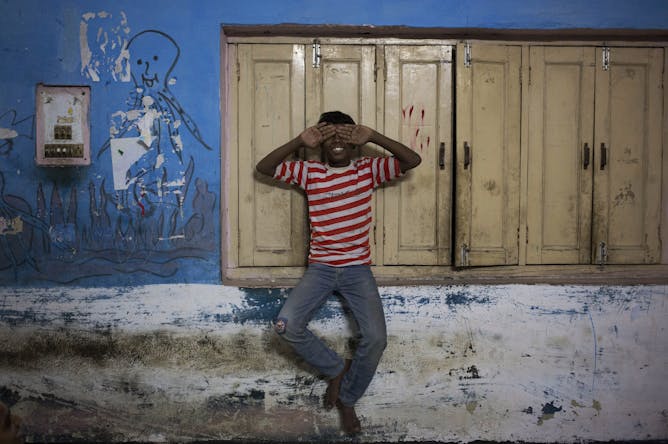|
It was almost four years ago that the 94 Calls to Action of the Truth and Reconciliation Commission were released. The No. 14 Call to Action urged the federal government to bring in an Aboriginal Languages Act. That hasn’t happened. Today in The Conversation Canada, Indigenous language scholar Frank Deer from the University of Manitoba writes about the need for Indigenous languages to survive and thrive: “Understanding meaning in an Indigenous language and how it may provide cultural and historical knowledge is essential to understanding for an Indigenous person’s own cultural identity.”
Here's what else we have to get you into the weekend: Roomana Hukil of McMaster University looks at the impact that the re-election of the right-wing BJP government will have on NGOs, some of which have been regarded by the government as anti-Indian; Joshua Davies of the Université du Québec à Montréal tells us about his research that looks at the patterns of layers in rock formations to better understand
the impact of climate change more than two billion years ago.
And we leave you with a story about new research on gestational diabetes – a temporary condition that occurs during pregnancy. But Kaberi Dasgupta of McGill University writes how gestational diabetes in mothers is linked to future diabetes not only in the mothers themselves, but also in their partners and children.
Regards,
|

Language is a complex structure. Here, Jeremy Dutcher performs during the Polaris Music Prize gala in Toronto on Sept. 17, 2018. Dutcher’s award-winning album Wolastoqiyik Lintuwakonawa is in the Wolastoqey language.
THE CANADIAN PRESS/Tijana Martin
Frank Deer, University of Manitoba
The presence of Indigenous peoples in conversations in Canada about the flourishing of Indigenous languages and critical Indigenous education is essential.
|

This 13-year-old boy from India’s Bihar state who worked 15 hours a day making bread was rescued by the workers of the Bachpan Bachao Andolan or Save Childhood movement in 2014. India’s far-right BJP is taking aim at NGOs.
(AP Photo/Bernat Armangue)
Roomana Hukil, McMaster University
Narendra Modi's BJP views NGO activists as defiant because they challenge conventional notions of power, social structures and hierarchies that conflict with the idea of Hindu majoritarianism.
|

New geological research reveals information about the Earth’s orbit and climate from billions of years ago.
Shutterstock
Joshua Davies, Université du Québec à Montréal (UQAM); Margriet Lantink, Utrecht University
Layers of rock provide a historical record of variations in the Earth's orbit, revealing information about the planet's climate billions of years ago.
|

New research shows that diabetes is a family affair.
(Shutterstock)
Kaberi Dasgupta, McGill University
Many couples share exercise, eating and weight patterns. Families of women with gestational diabetes and gestational hypertension more likely to develop Type 2 diabetes in the future.
|

Prendre un petit-déjeuner faible en glucides peut aider à réduire les fringales plus tard dans la journée – une stratégie simple et efficace non seulement pour les personnes souffrant de diabète de type 2, mais pour quiconque désirant améliorer son alimentation.
Shutterstock
Jonathan Little, University of British Columbia
De nouvelles recherches montrent qu'un petit-déjeuner faible en glucides réduit à la fois les pics de sucre le matin et les envies de sucre le soir, chez les personnes atteintes de diabète de type 2.
|
Politics
|
-
Trevor Griffey, University of California, Los Angeles
Publication was justified of information from the FBI that Martin Luther King Jr. witnessed and celebrated a woman’s rape, writes a historian, who warns the FBI had long wanted to destroy King.
-
Jason Miller, North Carolina State University
King was once thought of as a saint beyond reproach. It eventually emerged that he was a womanizer. But we now have to ask the unthinkable: Did King enable abuse?
|
|
Environment + Energy
|
-
Kate Campbell, University of Cape Town; Richard Sherley, University of Exeter
How African penguins and their chicks' respond to fish availability informs marine conservation.
|
|
Science + Technology
|
-
Niia Nikolova, University of Strathclyde ; Nick Wade, University of Dundee
People have always been intrigued by illusions, but only in the last century have they been able to teach us about the workings of the brain.
|
|